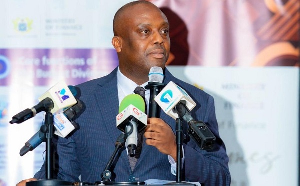Accra, Aug. 19, GNA - The Greater Accra Regional Directorate of Ghana Health Service (GHS) on Wednesday received clinical training models worth over 50,000 dollars to facilitate the development of clinical skills in maternal, new born health and family planning.
The presentation was under the "Focus Region Health Project (FRHP), a four-year United States Agency for International Development (USAID) cooperative agreement being implemented by John Snow Incorporated Research and Training Institute (JSI-RTI) and partner, World Education Incorporated.
The package includes birth simulators, neonatal resuscitation dolls and airbags, dummy foetuses and placentae, family planning education and training arms.
Mr David O'Brein, Chief of Party, JSI-RTI said the equipment would be used for trainers, supervisors, trainees and staff to strengthen the training programmes to improve the quality of services provided to clients, patients and residents in the Region.
He said the materials would in addition, be used in supervising the conduct of work at health centres within the regional health directorates to ensure the provision of the highest quality health care.
Mr O'Brein explained that the equipment were complementary to an extensive range of training and support activities being implemented by the directorate and staff over the past few months.
He said other donations of clinical supplies, including ante-natal care equipment, maternal health kits, newborn health supplies, BP apparatus, stethoscope, and weighing scales would soon be distributed to high performing health centres, CHPS zones and hospitals.
Ms Suzan Wrights, Reproductive and Child Health Advisor of USAID/Ghana, said the donation was to ensure that the standard of care being provided at the various health centres were uniform and up to standard.
Dr Irene Agyepong Amarteyfio, Greater Accra Regional Director of Health Services, receiving the equipment, expressed appreciation for the donation and said they would be distributed to the various hospitals and health centres in the Region.
Similar packages would be presented to the Central and Western Regional Health Directorates.
The three Regions comprised approximately a third of the country's population estimated at 7.9 million, therefore health impacts made would be significant enough to affect national rates.
FRHP was complementing efforts of the Ministry of Health (MOH) and the Ghana Health Service (GHS) by implementing high impact, comprehensive and integrated interventions to address critical health provider knowledge, attitudes, skills, as well as logistics and equipment to improve health systems and overall family, household and community health.
The project is expected to impact positively on national maternal and child health, family planning indicators and contribute to the attainment of the Millennium Development Goals (MDGs).
General News of Thursday, 19 August 2010
Source: GNA












